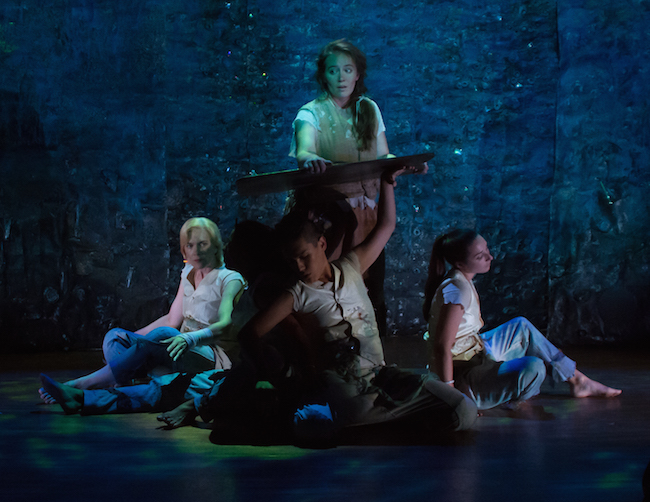Theater Review: “Plank” — A Magical Mystery Tour
Plank is a dream play that celebrates the state of dreaming (rather than consuming), and on that aesthetic and moral ground it succeeds admirably.
Plank by John Greiner-Ferris. Directed by Megan Schy Gleeson. Staged by the Alley Cat Theater at the Calderwood Pavilion at the Boston Center for the Arts, Boston, MA through September 16.

Poornima Kirby as Potpee in the Alley Cat Theater production of “Plank.” Photo credit: Joan Mejia
By Bill Marx
At times, Plank, John Greiner-Ferris’s gently humane counterculture fable, made me think of a playwright whose works I have read and appreciated but never seen performed – the Nobel prize-winning dramatist Maurice Maeterlinck. (He is best known today for his drama Pelléas et Mélisande, which was the basis for Claude Debussy’s opera.) Admired by writers as diverse as Mallarmé and Yeats, Artaud and Strindberg, this turn-of-the-century Symbolist writer saw the stage as the “temple of dream,” choosing to focus on inaction rather than action, expressive silences rather than dialogue. He explored a “theater of the unexpressed” by way of a radical minimalism located in a kind of transcendental nowheresville, a place (much like the unconscious) where poetic figures chockful of hidden meanings could be manifested on stage.
No one stages Maeterlinck anymore, unfortunately, partly because dreams, in the age of FX, are hard to pull off in the theater. They are often dismissed as cloying or shrill, precious or pretentious, particularly in our cynical, post-Freudian era. All the more credit to dramatist Greiner-Ferris, who does surprisingly well in conjuring up the innocence and wonder of the oneiric in this moving parable about a woman named Potpee who, after being shipwrecked, finds herself clinging for dear life on a plank adrift in the middle of the ocean. She is exhilarated by the sight of the starry night sky, listens to talking fish and sights friendly whales, and happens on a volume of Moby Dick, an epic that she reads with delight. Back on land, our misfit heroine encounters two representatives of our coarse and materialistic society, who refuse to let her “de-plank.” After some wordy back and forths, Potpee is ready to bolt back to the ocean, which, though filled with garbage, is the place for magic and meditation.
Grenier-Ferris’s conflicts are in the hallowed tradition of American rebellion, albeit with some ’60s-era admiration for the virtues of dropping out. The ornery individual battles the beliefs of respectable society; a life-enhancing connection with nature clashes with an alienated disconnection from what matters. Lighting out for the watery territories is the only escape from a world dedicated to profitable dehumanization — there’s no middle ground (though a belief in the latter saved Ishmael’s hide in Moby Dick). The choice is stark, to the point that the dramatist’s environmentally friendly politics are undercut: who is going to clean the trash out of our oceans if the righteous are content to float on their planks and stare up at the stars? The talking fish will be throttled into extinction. Is there no form of community that might be gathered out of mutually collaborative planks? Also, the forces of suburban darkness are caricatured via the bitch goddess, Mercedes, whom the audience can easily ID, laugh at, and then dismiss. (Nobody but us nonconformists in these seats!) And, predictably, Potpee’s defense of her choice to hit the waves eventually becomes preachy.

Poornima Kirby, Liz Adams, Adam Lokken, and Sydney Grant in the Alley Cat Theater production of “Plank.” Photo: Joan Mejia.
Still, Plank is a dream play that celebrates the state of dreaming (rather than consuming), and on that aesthetic and moral ground it succeeds admirably. Greiner-Ferris’s writing is humorous and pointed; director Megan Schy Gleeson has a firm sense of rhythm, particularly the snap and crackle of the physical; the performers are compelling and, for the most part, disciplined. At times, Poornima Kirby’s Potpee is too gung-ho — the playwright understandably pokes fun at cliches about going mad on the high seas, but surely William Golding’s brilliant novel Pincher Martin is relevant here: when man floats into the infinite, his or her ego serves as the final plank. But Kirby is charmingly bright-eyed, ably flanked by Liz Adams’s nicely strident Mercedes and Sydney Grant’s Thimble, who floats, indecisively, between two worlds — caged and free. I am not a big fan of undulation, and there is quite a lot of it here, especially from Fray Cordero and Adam Lokken as sprites/finny denizens of the deep. But the movement throughout the piece is varied and inventive enough to ward off skepticism; the aqua-blue/brown hued mesh set created by designer JiYoung Han is lovely, a memorable backdrop for a fantasy; and the sound design by Ned Singh is effectively moody.
With genial intelligence and imagination, Plank asks us to dream, to give in to the spell of the irrational. Are theatergoers, in our age of prefab theatrical formula, willing to take up the challenge? In a recent email blast, Greiner-Ferris advises audience members to “put away your notion of time and story-telling in the theater. Don’t try to control the theater in the way that Potpee first tries to control her plank, but instead, like Potpee, give in to the plank and let it take you on your own journey.” No doubt Maeterlinck and one of his inspirations, the great French poet Mallarmé, would agree. For the latter, theater should serve as “the open mouth of the chimera.” If not, the stage turns into “the jaws of the monster.” We need more plays like Plank if we are ever going to climb out of the belly of the beast.
Bill Marx is the editor-in-chief of The Arts Fuse. For over three decades, he has written about arts and culture for print, broadcast, and online. He has regularly reviewed theater for National Public Radio Station WBUR and The Boston Globe. He created and edited WBUR Online Arts, a cultural webzine that in 2004 won an Online Journalism Award for Specialty Journalism. In 2007 he created The Arts Fuse, an online magazine dedicated to covering arts and culture in Boston and throughout New England.
Tagged: Alley Cat Theater, John Greiner-Ferris, Liz Adams, Meagn Schy Gleeson, Plank
